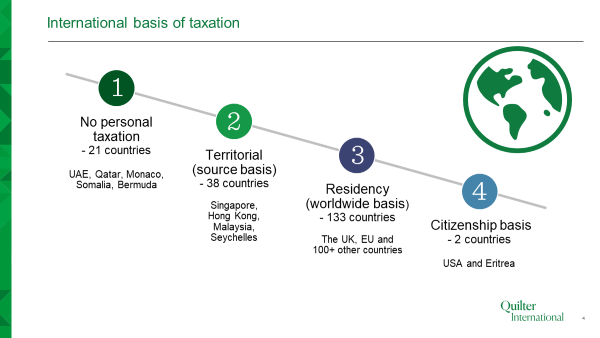The pace and scale of global mobility has accelerated in recent decades, for employment, lifestyle change and retirement. Those with cross border lifestyles, or arriving in counties anew, face increasingly complex regulations, laws and systems of taxation, whilst political agendas such as Brexit might have far reaching consequences. COVID-19 has also displaced people, particularly expatriates, and created its own financial planning challenges (from a UK perspective, please see https://www.linkedin.com/pulse/covid-19-global-mobility-taxation-david-denton-fpfs-tep/ ). Whilst personalized advice is invariably required, at least within the international tax system there are a number of key themes which can help to guide our thoughts, which this article seeks to explore for private clients.
Tax system models
There are broadly four tax systems relating to income and gains, with an almost infinite number of subtle but important variations amongst the 195 countries that the UN recognizes across five continents.
Twenty counties (as of February 2019) have no direct taxation, in other words residents do not suffer tax in that country on locally derived income or gains, or on foreign income or gains in the country in which they live. Well known amongst these are the UAE, Oman, Qatar and Monaco.
38 countries employ what is known as a source based (also known as a territorial) system. Here, only local income and gains, from a source inside that country, are charged to tax there. Examples include Singapore and Hong Kong.
In a residency (or worldwide) based system, residents of a country are taxed on their worldwide (local and overseas) income and gains. Such income and gains are in most situations taxable even if not remitted back to the country of the taxpayer’s residence. This last category represents the majority of countries amounting to 133, including most of Europe.
At the other end of the spectrum sits the US, where not only are residents taxed on their worldwide income and gains, but also non-resident citizens worldwide, including on their income and gains not from the US. This is known as taxation by citizenship. It’s probably this situation that contributed to the need to implement FATCA, the Foreign Account Tax Compliance Act, which since 2016 has required that foreign financial institutions and certain other non-financial foreign entities to report on the foreign assets held by their US citizen account holders to the Internal Revenue Service (IRS). Only one other country taxes their citizens worldwide similarly, that being Eritrea in East Africa.

Note that numbers of countries stated are approximate as at 2019.
Trends
Referring to the diagram above, the trend over recent decades has been for country systems to change in the top left to bottom right direction. However, although no extra countries have formerly become citizenship-based, there are a number of locations that have some of those qualities, because of their wide definitions of tax residence. For example, many South Africans overseas have retained their ‘ordinarily resident’ status. This common law nuance can easily mean that they are fully beholden to the tax system there, without any benefit for their contributions. The same could be said for Chinese overseas. Following recent tax reforms and enhanced guidance, it is clear that those retaining their domicile or ‘hoku’, (household registration) need to declare and pay ‘individual income tax’ (a tax that applies to gains as well as income) whether income or gains are remitted back to China or not, given the world’s most populous country employs a residency-based system.
Increased transparency, through the Common Reporting Standards (CRS), is increasingly allowing tax authorities to track, trace, collect and sometimes criminalize transgressors.
Double taxation
Because of the lack of tax harmonization, these variations create the potential for double taxation (where the same income or gains are taxed by different countries). Double tax treaties (also known as double tax agreements, or DTAs) which many countries enter into with each other, are designed to alleviate such possibilities. However, just like taxation, these aren’t always logical or consistent. Occasionally double tax treaties facilitate double non-taxation, where income or gains are not taxed at all. ‘Treaty shopping’ is the name given to those who attempt to exploit such miss-matches.
Death duties
It should be noted that the application of estate duties and inheritance taxes are often subject to significantly different rules, with individuals frequently unaware of their obligations, and very few double tax treaties to compensate. International law defines estate taxes as chargeable according to the estate of the deceased, often relating to their domicile or citizenship, whilst inheritance taxes relate to the value an individual beneficiary receives, and their personal circumstances, rather than that of the donor. In other words, the former is a donor-based tax, the latter recipient-based. UK domiciles at this juncture will note the system they are beholden to has the characteristics of an estate tax but is confusingly known as an inheritance tax (IHT)! Given three name changes and regimes in less than 50 years, it is perhaps unsurprising that the UK Office of Tax Simplification in 2015 rated UK IHT as the third most complex tax out of 107 taxes considered.
It is also worth noting that residents and citizens of a country where there is no death tax can still see a liability emerge if wealth is situated in country where the tax applies, and examples of this include ownership of UK or US stock.
For example, a Singapore parent leaving wealth to a Singaporean heir might expect death taxes not to apply, as death taxes were abolished in Singapore in 2006. However, above an exemption of £325,000 the deceased’s UK shares could be subject to a 40% liability, and above just US$60,000 a US liability on US wealth for the same client (even if held on an overseas banking platform) of between 18 and 40%.
The UK has just ten double tax treaties* for IHT, and US has 16**. Whilst unilateral relief might be available, this should not be relied upon.
* https://www.gov.uk/guidance/inheritance-tax-double-taxation-relief
** https://www.irs.gov/businesses/small-businesses-self-employed/estate-gift-tax-treaties-international
Planning opportunities
In the aforementioned situation for IHT, purchasing UK or US securities through an insurance bond as opposed to a conventional banking or proprietary trading platform ensures the policyholder is detached form the underlying asset. This should apply equally to any owner from a country outside the narrow range of DTAs the UK and US have, and even some where the there is a DTA, but the UK or US has a higher rate than where the individual is domiciled.
Regarding income and gains on investments, for those who are residents of countries subject to taxation according to their residency (a worldwide basis), which make up over two thirds of all countries, there is a clear distinction between owning wealth directly or on a conventional trading platform compared to through an insurance bond. Normally, through direct ownership or through a trading platform, for tax purpose the liability on income and gains occurs annually as they arise, often even if not remitted to where they live. When held through a bond, all income (dividend, coupon, rent and interest) as well as on gains when holdings are realised within the bond, do not give rise to a liability at that point in time. This principle is known as gross roll-up and can be valuable in a number of ways. Firstly, tax deferred means that tax on profit that would have been deducted annually works for the investor for longer before it becomes chargeable. Secondly, if a policyholder’s tax rate drops, or they move to a country where tax rates are lower, is source based or charges no tax, the savings can be significant. Thirdly, for an arriver into the UK (from any other country), full credit is given for time spent overseas, known as time apportionment relief, that could mean almost the full value of profit can legitimately be removed from personal taxation.
Wealth transfer
How clients can pass on their wealth depends on the law of the country where they and their wealth is situated, which can make succession planning challenging, yet many investors are blissfully unaware of the difficulties they will leave their loved ones. For individuals subject to Common Law, wills, trusts and nominations are effective in helping clients to retain control over their wealth and potentially manage inheritance tax. Trusts can be used with insurance bonds to ensure wealth is distributed in line with the policyholder’s wishes quickly (without probate) and confidentially (unlike wills which are public knowledge following death). The same is true for beneficiary nominations with insurance bonds, with the additional benefits that the policyholder retains control in their lifetime, can easily change their minds, and without the additional cost associated with trusteeship.
Where the common law doesn’t apply, there may still be scope for using trusts and policy nominations with insurance bonds, according to the individual’s citizenship and location of their wealth, with appropriate financial and/or legal advice.
Conclusion
As ever, the devil is in the detail, but the value of an adviser is in understanding how these subtleties and nuances, combined with the product options available, can become meaningful tax planning solutions, in ever changing cross-border situations.
The information provided in this article is not intended to offer advice.
It is based on Quilter International’s interpretation of the relevant law and is correct at the date this blog was published. While we believe this interpretation to be correct, we cannot guarantee it. We cannot accept any responsibility for any action taken or refrained from being taken as a result of the information contained in this blog.








